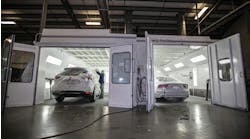As of two years ago, there were maybe only one or two members of my 20-group who had much interest in OEM shop certifications. But that’s changed significantly this last year. I believe now that every one of the companies in the group — all of which are multi-shop operations — is now working toward OEM certifications.
Our belief — based on what the automakers themselves are saying at industry events — is that the OEMs are going to take a much stronger role in how and where their vehicles get repaired after an accident.
Several of the members in my 20-group have gone for the really high-end vehicle certifications: Tesla, Audi, Porsche. We’ve chosen to pursue certification for the most common vehicles we repair: Chevrolet, Ford, Chrysler, Toyota. My goal is that by the end of this first quarter of 2017, we’ll have all those certifications.
A big step for us has been earning the I-CAR Gold Class designation. I’ll talk about that specifically in an upcoming column. But we see that and the OEM certifications as going hand-in-hand. As I tell my staff, the automotive industry is going through exponential change. At one conference it was noted that cars have changed more in the last five years than they did in all the prior decades before since the first car was built. And that’s not going to stop. We have to be ready for a crazy amount of change.
The I-CAR training and OEM training, certification and information are now critical to make sure we are as up to date as we can be. That’s why it’s become a key focus for us.
Get Free OEM Training |
|

|
Now is your chance to register for an expo pass to NACE Automechanika Chicago, where you'll have a chance to walk the show floor and take part in free OEM trainings. |
I’m aware of the concerns within the industry about some aspects of the OEM certification programs. There’s the issue of having to buy what seems like duplicative tools and equipment. We bought an $8,000 rivet gun for one of the programs, for example, that has sat in the unopened box for at least five months. I had to buy another resistance spot welder just because the one we had wasn’t “on the list.” That is frustrating.
But when the time comes to fix a car that requires that equipment, we know we will have what the automaker wants us to use on that vehicle. I like to remind myself: Many shops don’t even know that Honda requires a specific welding wire be used. Do I really want to be a shop that’s not using what the automaker knows works best for their vehicles?
There’s also the concern about whether there will be an adequate return on a collision repairer’s investment in OEM certification. I’ve heard some shops grumble that they fixed no more Brand X cars in the year after they got certified by Brand X than they did the year prior to getting certified.
What I’d ask those shops is: What are you doing to market yourself as being certified by Brand X? If I go to your website, are you promoting it there? How about in your social media efforts? If I visit your lobby, will I barely be able to find the plaque or anything that talks about your certification
Maybe my opinion will change after we’ve been certified for a year. But I think it’s the shop’s responsibility to use the tools the automakers provide. When some shops in my 20-group who were unhappy with an automaker certification were really honest with themselves, they acknowledged they hadn’t done their part to make it successful. It has to be a team effort.
That said, I think you’re also going to see a bigger push in the next couple of years by the OEMs to get work into their certified shops. One of my technicians came to me recently with an email his wife received. She drives a Nissan, and the email told her that if she’s in an accident, she should take her car to this particular shop because it’s Nissan certified. He was shocked.
It was a good opportunity to tell that technician that’s why I’ve been bombarding them with training lately. The automakers are more concerned than ever that their cars are fixed the right way. We’re positioning ourselves, I told him, for that type of certification from other automakers.





